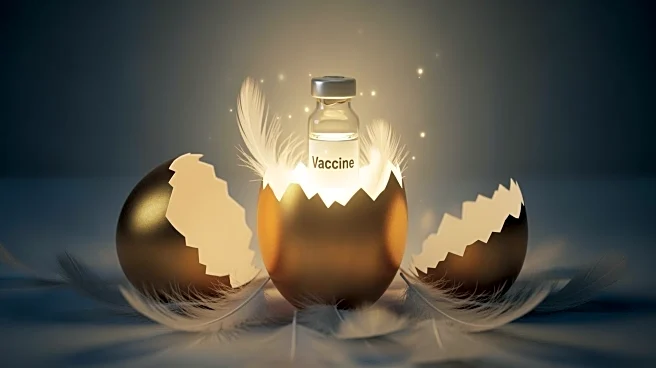What's Happening?
The egg industry is pressing the U.S. Department of Agriculture (USDA) to accelerate the approval and implementation of a vaccination program to combat highly pathogenic avian influenza (HPAI). During
the American Egg Board and United Egg Producers annual conference, industry leaders highlighted the availability of a vaccine that requires USDA and state veterinarian approval. The proposed vaccination would target laying hens and turkeys, complementing existing biosecurity measures. The urgency stems from the significant losses experienced during past outbreaks, including the 2014-15 incident where 42 million birds were lost. The industry has invested heavily in biosecurity over the past decade, yet HPAI continues to affect flocks across nearly all 50 states, with 41.4 million laying hens lost in 2025 alone. The vaccination strategy involves administering two shots to chicks and pullets, focusing on vulnerable areas such as the Mississippi flyway, a major migratory path for wild birds.
Why It's Important?
The ongoing HPAI outbreaks pose a severe threat to the U.S. egg industry, impacting production and economic stability. The loss of millions of birds not only affects supply but also drives up costs for producers and consumers. Implementing a vaccination program could mitigate these losses and stabilize the industry. However, international trade complications arise, as some countries may reject eggs from vaccinated flocks, affecting export markets. Despite this, the domestic benefits of controlling HPAI through vaccination could outweigh the trade challenges, ensuring a more resilient egg supply chain. The industry's call for expedited action reflects the critical need to protect against future outbreaks and safeguard economic interests.
What's Next?
The USDA's response to the industry's call for action remains uncertain, with no timeline provided for vaccine approval. If approved, the vaccination program would require coordination with state veterinarians and adaptation to international trade policies. The industry may continue to lobby for swift action, emphasizing the economic and operational impacts of HPAI. Stakeholders, including producers and policymakers, will need to address trade concerns while prioritizing domestic biosecurity. The potential for future outbreaks during migratory seasons underscores the urgency for a comprehensive vaccination strategy.
Beyond the Headlines
The ethical considerations of depopulating infected flocks, even if vaccinated, highlight the complex nature of disease management in agriculture. Balancing biosecurity with humane treatment of animals remains a challenge. Additionally, the industry's reliance on biosecurity measures and vaccination raises questions about long-term sustainability and adaptation to evolving disease threats. The broader implications for agricultural policy and international trade relations may influence future strategies in managing animal health crises.











